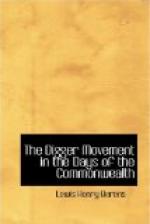people of whom he regarded himself as ruler by right
divine, whose futile domestic policy was inspired solely
by considerations for the advancement of his own personal
power, whose feeble and shifty foreign policy was
determined only by considerations for his own family
interests, who intrigued with France against Spain,
with Spain against France, with both against Holland,
and with Holland against both, and with France, Spain,
Holland, and Rome against his own subjects, with English
Presbyterians against English Independents, with English
Independents against English Presbyterians, and with
Irish Catholics and Scotch Presbyterians against both
English Presbyterians and Independents, and who yet
succeeded in deceiving nobody but himself, and in
satisfying nobody, not even himself; a king whose love
was far more dangerous than his hate, a worthy patron
of a Buckingham, a Goring, or of a Laud, but unworthy
the genius of a Shaftesbury or the loyal services
of a Verney, a Montrose, or a Worcester; a king, in
short, treacherous to his friends, faithless to his
word, who went to his wedding and came to his throne
with a lie on his lips,[24:1] whom, again to use the
words of Macaulay,[24:2] “no law could bind,
and whose whole government was one system of wrong,”
of whom even the conservative and partial Hallam is
forced to admit[24:3] that “it would be difficult
to name any violation of law he had not committed.”
Even the famous Petition of Right, to which some nine
years previously, in 1628, he had given a solemn,
though reluctant, consent, had been ruthlessly violated.
Taxes had been levied by the Royal authority; patents
of monopoly had been granted; the course of justice
had been tampered with, and judges arbitrarily deposed;
troops had been billeted upon the people; old feudal
usages had been revived for the express purpose of
harassing and defrauding the citizens; and, as if
to exhaust every means to sap the loyalty and wear
out the patience of the people, Puritans of every shade
of opinion had not only been silenced but relentlessly
persecuted, while High Church bishops preached passive
obedience, declaring the persons and the property
of subjects to be at the absolute disposal of the
sovereign, and in the name of religion inaugurating
a systematic attack on the rights and liberties of
the nation.
The people whose representatives a quarter of a century previously, in 1604, had met the insolent claims of James the First with the dignified rejoinder, that “your Majesty should be misinformed if any man should deliver that the kings of England have any absolute power in themselves either to alter religion, or to make any laws concerning the same, otherwise than in temporal causes by consent of Parliament,"[25:1] were, however, not easily to be intimidated. Despite a Royal order to adjourn, the House of Commons of 1629, holding the Speaker by force in the Chair, supported the immortal Eliot in his last assertion of English liberty, and by successive resolutions




